The Department of Justice has said "no changes have been made to the arrangements with respect to international protection applications from Syrian nationals at this time".
In a statement, the Dept said the situation is being "kept under review and will need to be discussed with EU Member State colleagues".
It comes as Britain, Germany, France and several other European countries said they would freeze all pending asylum requests from Syrians, a day after president Bashar al-Assad was ousted from power.
While Germany and other governments said they were watching the fast-moving developments in the war-ravaged nation, Austria signalled it would soon deport refugees back to Syria.
Far-right politicians elsewhere made similar demands, including in Germany - home to Europe's largest Syrian community - at a time when immigration has become a hot-button issue across the continent.
World leaders and Syrians abroad watched in disbelief at the weekend as Islamist-led rebels swept into Damascus, ending Assad's brutal rule while also sparking new uncertainty.
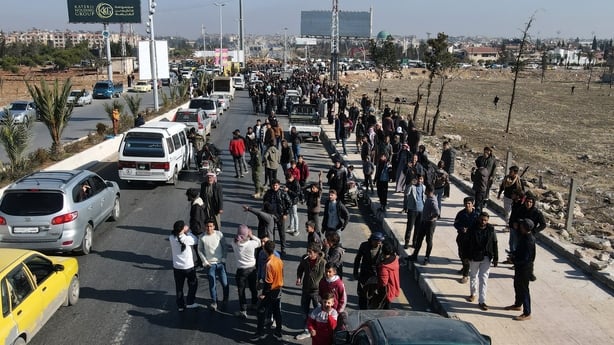
A German foreign ministry spokesman pointed out that "the fact that the Assad regime has been ended is unfortunately no guarantee of peaceful developments" in future.
Germany has taken in almost one million Syrians, with the bulk arriving in 2015-16 under ex-chancellor Angela Merkel.
Interior Minister Nancy Faeser said many Syrian refugees "now finally have hope of returning to their Syrian homeland" but cautioned that "the situation in Syria is currently very unclear".
The Federal Office for Migration and Refugees had imposed a freeze on decisions for ongoing asylum procedures "until the situation is clearer".
She added that "concrete possibilities of return cannot yet be predicted and it would be unprofessional to speculate in such a volatile situation."
Rights group Amnesty International slammed Germany's freeze on asylum decisions, stressing that for now "the human rights situation in the country is completely unclear".
The head of the UN refugee agency also cautioned that "patience and vigilance" were needed on the issue of refugee returns.
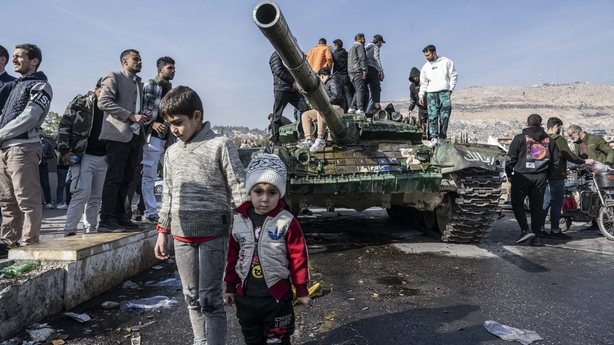
In Austria, where about 100,000 Syrians live, conservative Chancellor Karl Nehammer instructed the interior ministry "to suspend all ongoing Syrian asylum applications and to review all asylum grants".
Interior Minister Gerhard Karner added he had "instructed the ministry to prepare an orderly repatriation and deportation programme to Syria".
"The political situation in Syria has changed fundamentally and, above all, rapidly in recent days," the ministry said, adding it is "currently monitoring and analysing the new situation".
The French interior ministry said it too would put asylum requests from Syrians on hold, with authorities in Belgium, the Netherlands, Switzerland, Denmark, Sweden and Norway announcing similar moves.
Britain's Home Office said it was taking the same measure "whilst we assess the current situation".
The leader of the far-right Sweden Democrats, a coalition partner in the government, said residence permits for Syrian refugees should now be "reviewed".
"Destructive Islamist forces are behind the change of power" in Syria, wrote their leader Jimmie Akesson on X.
"I see that groups are happy about this development here in Sweden. You should see it as a good opportunity to go home."
In Greece, a government spokesman voiced hope that Assad's fall will eventually allow "the safe return of Syrian refugees" to their country, but without announcing concrete measures.
'Populist and irresponsible' - German politician
In Germany, the debate gained momentum as the country heads towards February elections.
The centre-right opposition CDU suggested that rejected Syrian asylum-seekers should now lose so-called subsidiary protection.
"If the reason for protection no longer applies, then refugees will have to return to their home country," CDU legislator Thorsten Frei told Welt TV.
CDU MP Jens Spahn suggested that Berlin charter flights to Syria and offer €1,000 euros to "anyone who wants to return".
A member of Chancellor Olaf Scholz's Social Democrats criticised the debate as "populist and irresponsible".
Greens party deputy Anton Hofreiter also said "it is completely unclear what will happen next in Syria" and deportation talk was "completely out of place".
Many Syrians in Germany have watched the events in their home country with great joy but prefer to wait and see before deciding whether to return.
"We want to go back to Syria," said Mahmoud Zaml, 25, who works in an Arabic pastry shop in Berlin, adding that he hopes to help "rebuild" his country.
"But we have to wait a bit now," he told AFP. "We have to see what happens and if it is really 100 percent safe, then we will go back to Syria."
Syrians search for loved ones missing in Assad's jails
Syrian rescuers have searched a jail synonymous with the worst atrocities of Assad's rule, as people in the capital flocked to a central square to celebrate their country's freedom.
Mr Assad oversaw a crackdown on a democracy movement that erupted in 2011, sparking a war that killed 500,000 people and forced half the country to flee their homes.
At the core of the system of rule that Mr Assad inherited from his father Hafez was a brutal complex of prisons and detention centres used to eliminate dissent by jailing those suspected of stepping out of the ruling Baath party's line.
Rescuers from the Syrian White Helmets said they were searching for secret doors or basements in Saydnaya prison, looking for any detainees who might be trapped.
"We are working with all our energy to reach a new hope, and we must be prepared for the worst," the organisation said in a statement.
While Syria has been at war for 13 years, the government's collapse ended up coming in a matter of days, with a lightning offensive launched by the Islamist Hayat Tahrir al-Sham (HTS).
Rooted in Syria's branch of Al-Qaeda, HTS is proscribed by Western governments as a terrorist group.
While it remains to be seen how HTS operates now that Mr Assad is gone, it has sought to moderate its image and to assure Syria's many religious minorities that they need not fear.
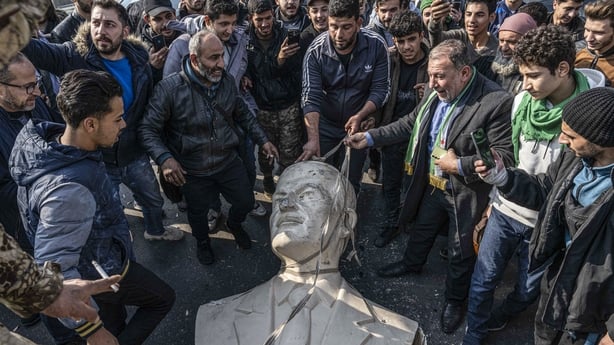
In central Damascus, despite all the uncertainties for the future, the atmosphere was filled with joy.
"It's indescribable, we never thought this nightmare would end, we are reborn," 49-year-old Rim Ramadan, a civil servant at the finance ministry, told AFP.
"We were afraid for 55 years of speaking, even at home, we used to say the walls had ears," Ms Ramadan said, as people honked their car horns and rebels fired their guns into the air.
"We feel like we're living a dream."
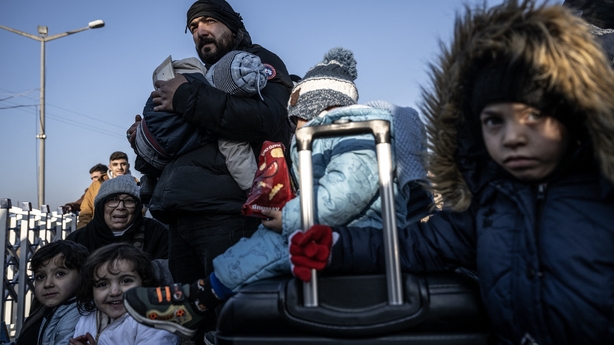
During the offensive launched on 27 November, rebels wrested city after city from Mr Assad's control, opening the gates of prisons along the way and freeing thousands of people, many of them held on political charges.
Social media groups were alight with Syrians sharing images of detainees reportedly brought out from the dungeons, in a collective effort to reunite families with their loved ones, some of whom had been missing for years.
Others, like Fadwa Mahmoud, whose husband and son are missing, posted calls for help finding their loved ones.
"Where are you, Maher and Abdel Aziz, it's time for me to hear your news, oh God, please come back, let my joy become complete," wrote Ms Mahmoud, herself a former detainee.
US President Joe Biden said Assad should be "held accountable" as he called his downfall "a historic opportunity" for the people of Syria.
We need your consent to load this rte-player contentWe use rte-player to manage extra content that can set cookies on your device and collect data about your activity. Please review their details and accept them to load the content.Manage Preferences
"The fall of the regime is a fundamental act of justice," he said.
But he also cautioned that hardline Islamist groups within the victorious rebel alliance would face scrutiny.
"Some of the rebel groups that took down Assad have their own grim record of terrorism and human right abuses," Mr Biden said.
The United States has taken note of recent statements by the rebels suggesting they were adopting a more moderate posture, but Mr Biden said: "We will assess not just their words, but their actions."
Amnesty International also called for perpetrators of rights violations to face justice, with its chief Agnes Callamard urging the forces that ousted Assad to "break free from the violence of the past".
"Any political transition must ensure accountability for perpetrators of serious violations and guarantee that those responsible are held to account," UN rights chief Volker Turk said.
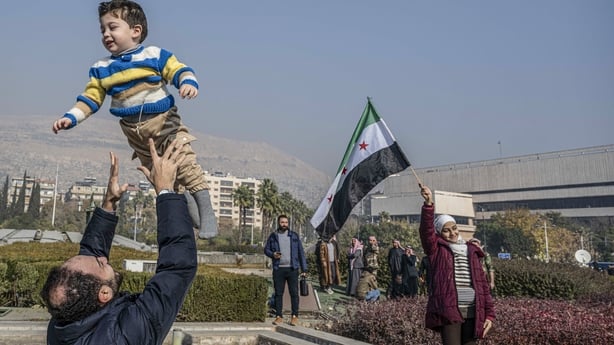
How Mr Assad might face justice remains unclear, especially after Russia refused to confirm reports by Russian news agencies that he had fled to Moscow.
The Syrian embassy in Moscow raised the flag of the opposition, and the Kremlin said it would discuss the status of its bases in Syria with the new authorities.
Russia played an instrumental role in keeping Assad in power, directly intervening in the war starting in 2015 and providing air cover to the army on the ground as it sought to crush the rebellion.
Iran, another key ally of Assad, said it expected its "friendly" ties with Syria to continue, with its foreign minister saying the ousted president "never asked" for Tehran's help against the rebel offensive.
Turkey, historically a backer of the opposition, called for an "inclusive" new government in Syria, as the sheer unpredictability of the situation began to settle in.
"It is not just Assad's regime falling, it is also the question of what comes in its place?" said Aron Lund, a specialist at the Century International think tank.
Read more:
Why has Assad's regime fallen now and what happens next?
Syrian rebels oust Assad, seize control of Damascus
Latest Middle East stories
While Syria's war began with a crackdown on grassroots democracy protests, it morphed over time and drew in jihadists and foreign powers backing opposing sides.
Israel, which borders Syria, sent troops into a buffer zone after Mr Assad's fall, in what Foreign Minister Gideon Saar described as a "limited and temporary step".
A Syria war monitor said that Israel also carried out overnight strikes on Syrian military positions and depots in several parts of the country.
And in northern Syria, a Turkish drone strike on a Kurdish-held area killed 11 civilians, six of them children, according to the Syrian Observatory for Human Rights war monitor.
We need your consent to load this rte-player contentWe use rte-player to manage extra content that can set cookies on your device and collect data about your activity. Please review their details and accept them to load the content.Manage Preferences

